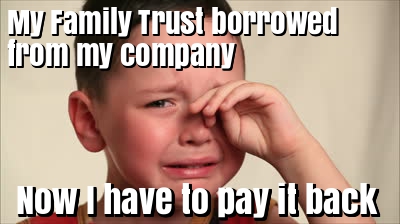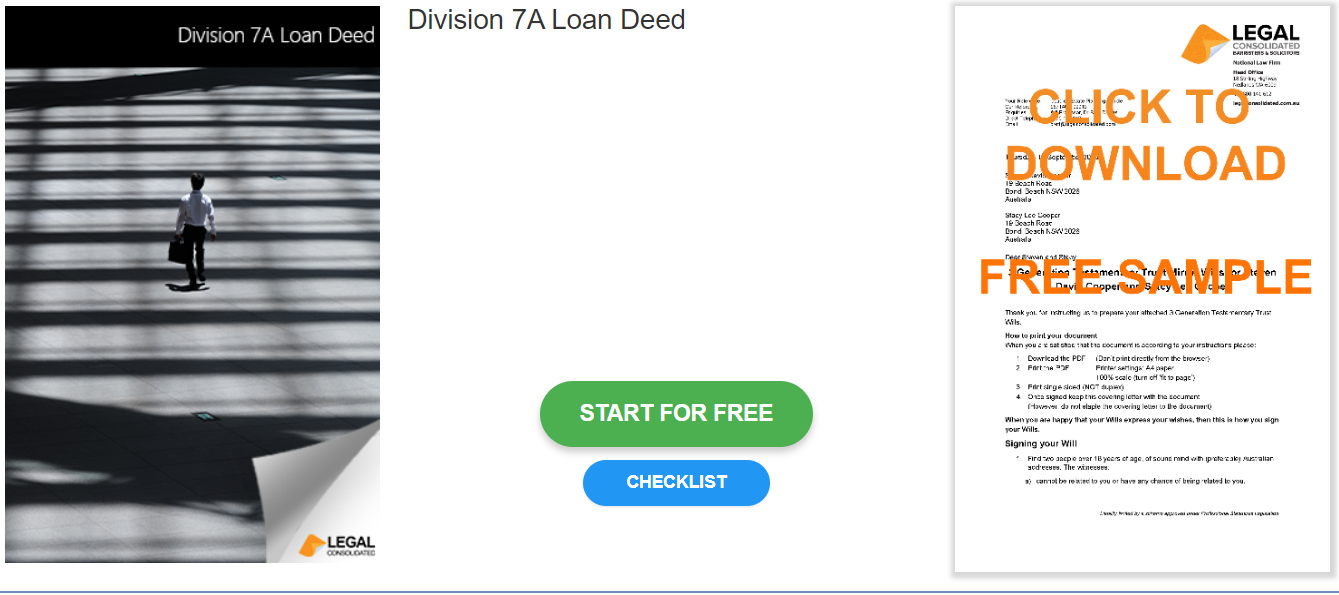Need a Division 7A when the Family Trust lends money to a bucket company?
You distribute Family Trust income to your children and spouse. As much as you can. But you run out of family members on a low marginal tax rates. The Family Trust then distributes the rest of the Family Trust income to the ‘bucket’ company.
But the Family Trust has no actual money to pay the beneficiaries (including the company) the income.
This is the case for most Family Trusts. The Family Trust is actually ‘borrowing’ money from your children, spouse and the bucket company. These could be called ‘loans’. But such unpaid moneys are correctly called “Unpaid Present Entitlements” (UPE). But for the sake of simplicity, we will call them a “loan” from the bucket company to the Family Trust.
In effect the Family Trust now owes that money to the ‘bucket’ company. The company is lending the (unpaid distribution) as a loan to the Family Trust.
Therefore, you must build a Division 7A Loan Agreement.
Tax advantages of a Family Trust distributing to a bucket company.
But becareful of Div 7A
A corporate beneficiary is a company. It receives a distribution from a discretionary trust.
The company declares its trust income. The bucket company pays tax at a constant tax rate of 30% (or less).
This 30% tax rate is less than the highest marginal tax rate of a human. A human pays tax of up to 47%. Therefore, the distribution to the company saves 17% tax.
The use of a bucket company may help protect the wealth of humans who are exposed to business risk.
A Discretionary Trust is an ‘assoicate’ for Division 7A
A Division 7A Loan protects loans from your company to a shareholder or ‘associate’.
Your Family Trust is an ‘associate’. Your Family Trust must have its own Div 7A Deed. Mum, Dad and the children each need their own person Div 7A Loan Deed. So to, the Family Trust must also have its personal Division 7A Loan Agreement.
An example of where a family trust needs a Division 7A Loan Deed
Kenneth Nominees Pty Ltd is trustee of the Ken & Julie Smith Family Trust ABN 8383738373837. (It is not being used as a bucket company.) It only acts as a Corporate Trustee of that family trust.
Bucketto Pty Ltd is a beneficiary of the Ken & Julie Smith Family Trust. Buketto Pty Ltd is a bucket company.
The Appointor of the Ken & Julie Smith Family Trust directs Kenneth Nominees Pty Ltd (as the trustee) to sign a Distribution Minute.
The Distribution Minute distributes all family trust income to Buketto Pty Ltd.
Sadly there is no actual cash to make good on the distribution. So the Family Trust owes this money to Buketto. But the proper name is a UPE.
To comply with Division 7A, the Family Trust must build a Division 7A Deed:
Lender: Bucketto Pty Ltd
Borrower: Kenneth Nominees Pty Ltd is trustee of the Ken & Julie Smith Family Trust ABN 8383738373837
But a company lending to another company does not need a Division 7A Loan?
That is correct. A company (in its own right) can lend money to another company (in its own right). This is without getting involved with Division 7A. In that instance, no Division 7A Deed is required.
But in the above example, Kenneth Nominees Pty Ltd is not itself borrowing any money. Instead, Kenneth Nominees is acting in the capacity of trustee of a family trust. It is the family trust that is borrowing the money from Bucketto Pty Ltd. Therefore, a Dision 7A Loand Deed is required.
How to build a Div 7A Loan when the family trust is borrowing money from the company?
This is how to build a Div 7A when the borrower is a Family Trust:
- Lender: the company lending the money

- Borrower: the Trustee of the Family Trust borrowing the money
1. Example when the Trustee of the Family Trust is a company:
- Lender: Generous Pty Ltd (this is the company lending the money)
- Borrower: Abacus Pty Ltd as trustee of the Smith Family Trust
2. For Example when the Trustee is a single human
- Lender: Generous Pty Ltd (this is the company lending the money)
- Borrower: Colin James Smith as trustee of the Smith Family Trust
3. Example when the Family Trust’s Trustee is two humans
- Lender: Generous Pty Ltd (this is the company lending the money)
- Borrower One: Jake Chen James as trustee of the Smith Family Trust
- Borrower Two: Mary Chow James as trustee of the Smith Family Trust
Why build a Div 7A when the borrower is a Family Trust?
By building a Div 7A, the loans by the company to the Family Trust are not classified as dividends and do not suffer penalty interest rates. These rules are set out in Division 7A of the Income Tax Assessment Act 1936 (Cth).
A Div 7A Loan Deed requires that the Family Trust (borrower) repays 1/7th of the loan each year, as well as interest rate set by the ATO.
Why did the government make this law about Div 7A when the borrower is a Family Trust?
Companies pay a low flat tax rate of 30% or less. In contrast, mum and dad pay up to 47% in tax. Therefore, in the good old days (before Div7A) mum and dad would:
- have the company earn the income and pay the low tax rate
- the company then lends mum and dad the money
- Mum and Dad buy a boat, have a holiday or whatever with the money
- Mum and Dad never bother to pay back the debt
- therefore, Mum and Dad never bother to pay the difference between the low company tax rate and the higher tax rate that Mum and Dad would of have to have paid if they had earned the money
- there was an indefinite tax deferral.
The government got sick and tired of this. It introduced Div 7A. Now, Mum and Dad need a proper commercial loan deed. This is called a ‘Div 7A Loan Deed‘. Plus Mum and Dad have to pay back the money that the company lent them.
ATO starts applying Div 7A to bucket companies – ATO TR 2010/3
The ATO issued TR 2010/3 in June 2010. The ATO’s long-standing position changes on bucket company UPEs and Division 7A. Now under TR 2010/3 the UPE is allowed to subsist. But it is treated as a loan. And the loan is now subject to Division 7A.
In recognition of the change of fashion, the ATO quarantinedsUPEs in existence before 15 December 2009.
The effect of TR 2010/3? There is no longer an indefinite tax deferral. This is for distributions made to bucket companies after 15 December 2009.
But these pre-2009 ‘loans’ can go out of date. This is how to refresh them without converting them into the Div 7A regime.
What is the purpose of Div 7A when the borrower is a Family Trust?
Div 7A ‘ensures that private companies will no longer be able to make tax-free distributions of profits to shareholders (and their associates) in the form of payment or loans’: Explanatory Memorandum to Act No 47 of 1998. Further:
‘It ensures that all advances, loans and other credits by private companies to shareholders (and their associates), are treated as assessable dividends. This is to the extent that there are realised or unrealised profits in the company. In addition, debts owed by shareholders (or associates) which are forgiven by private companies are treated as dividends.’
What does Division 7A have to do with Family Trusts?
Family Trusts earn money each year. The Family Trust hunts down beneficiaries with the lowest marginal tax rate. Often the Family Trust distributes to a company. This is because the company pays a low fixed rate of tax.
The Family Trust then ‘distributes’ income to the company beneficiary. However, as is commonly the case no money actually changes hands. The Family Trust merely has an obligation to pay the money to the company. This is called a ‘present entitlement’ and is enough to have the company pay the tax (at its low tax rate). This obligation used to be called a ‘loan’ from the company back to the Family Trust. But now we call them a much fancier name: ‘Unpaid Present Entitlement’ (UPE).
You need to build a Div 7A Deed between the company (as Lender) and the trustee of the family trust (as Borrower).
Why not just use the name of the Family Trust as the Borrower?
Trusts only operate through a trustee. The Borrower is the ‘Trustee’ of the Family Trust.
What if the Trustee of the Family Trust also borrows money in her own right?
Let us say Mum is the trustee of the Family Trust. The Family Trust borrows money. Mum also borrows money from the company to buy a new necklace. You need two separate Div 7A Deeds. You need a separate Div 7A when the borrower is a Family Trust. Then you need a separate Div 7A for Mum, as well.
Does the Legal Consolidated Div7A allow the paying of the annual Div7A loan by setting off a company dividend?
Division 7A, found in Part III Income Tax Assessment Act 1936 (Cth) (ITAA36), serves as an integrity regime. It is designed to prevent shareholders and their associates from accessing a private company’s profits taxed only at the low company rate. There is an ongoing compliance obligation to make a minimum annual repayment for a complying Div 7A loan.
Div 7A loan repayments typically do not involve direct monetary transfers but, instead, rely on offsetting against a company-declared dividend. This strategy creates mutually opposing obligations when the borrower is also a shareholder, facilitating a cashless repayment process.
To meet the minimum annual Div 7A loan repayment there is a common practice of meeting the obligation by offsetting it against a company-declared dividend. Legal Consolidated allows for the satisfaction of the annual minimum payment without money moving among the parties. But your accountant needs to be careful. This strategy creates mutually opposing obligations when the borrower is also a shareholder, facilitating a cashless repayment process. Not all round-robin payments are effective. Also, make sure your accountant prepares and gets you to sign the Trust Distribution Minute signed early.
Most Div 7A loan repayments are made by way of set-off against a dividend declared by the company. As well as the above make sure that the dividend is validly declared.
Family Trust Div 7A: “corporate beneficiary” vs “bucket company”
A company that you have an interest in usually automatically becomes a beneficiary of a Family Trust. Such a company has two common nicknames:
- corporate beneficiary
- bucket company
Both expressions mean the same thing.
What do I get when building a Division 7A?
Build the Div 7A online. You get:
- Our law firm’s signed letter of advice on our law firm’s letterhead confirming our law firm authored the Div 7A Deed
- Minutes
- Division 7A Loan Deed for a Family Trust
Why is it better to prepare my Div 7A with the Family Trust as a borrower on our law firm’s website?
You are dealing directly with a law firm’s website, therefore you:
- we are responsible for the Div 7A Loan for a Family Trust
- free legal advice to help you build the Family Trust Div 7A Agreement
- hints and videos for every question as you build the Div 7A
- see a full sample of Div 7A before you start building
- law firm letter confirming we authored the document
- legal professional privilege
A UPE is not a ‘Loan’ for Div 7A Purposes: Bendel and FCT [2023] AATA 3074
Bendel and FCT – the ATO loses with egg on its face
Bendel and FCT [2023] AATA 3074 sheds light on the treatment of Unpaid Present Entitlements (UPEs) under Division 7A of the Income Tax Assessment Act 1936 (ITAA 1936). At Legal Consolidated, we closely examine this case and its implications for taxpayers and advisers. The court case confirms our view: the position taken by the Australian Taxation Office (ATO) was wrong.
Background of Bendel and FCT
The case involved Mr B and Gleewin Investments Pty Ltd, members of the Bendel group. Gleewin Investments (as a bucket company) holds a substantial UPE from the 2005 Family Trust for several income years. The Family Trust owes the bucket company about $1.66 million. The ATO took the position that this UPE is a loan to the bucket company. If the ATO is correct (it wasn’t) that makes the loan subject to the Division 7A rules.
The taxpayer, Gleewin Investments Pty Ltd is a ‘bucket company‘. In other words, it is a beneficiary of a Family Trust. The Family Trust ‘distributes’ (but does not actually pay any money) the bucket company a share of the Trust’s income:
- The ‘distributions’ are recorded in the ‘Current Account’. This is on behalf of the bucket company.
- And reported in the ‘Liabilities’ side of the Family Trust’s balance sheet as a stand-alone account.
As is often the case, the Family Trust, during the financial year, pays some of the company’s bills. These are also recorded in the current account. They reduce the money the Family Trust ‘owes’ to the bucket company. Conversely, there are some tax refunds for the company. These are kept by the Trustee of the Family Trust. This is because the company does not operate a bank account.
The current account that remains unpaid the ATO assesses as a deemed dividend. This is under section 109D of the Income Tax Assessment Act 1936. These are the Division 7A rules.
Are UPEs actually loans or separate trusts? Bendel and FCT
The crux of the matter lies in whether these UPEs are loans. The Taxpayers argue:
- that the creation of a separate trust upon vesting entitlements to income did not involve a loan; and
- the entitlement to income comes from a trust relationship. This is not a debtor-creditor arrangement, as argued by the ATO. This is an ingenious argument.
Key Decision Points of Bendel and FCT
The formidable Deputy President O’Loughlin, in his ruling, dismissed the notion of a conventional separate trust being formed that could discharge or replace the obligation to pay income entitlements. Instead, he viewed the beneficiary’s interest in trust income as an equitable obligation upon the trustee, not as property owned or controlled by the trustee.
The Court also highlighted the risk of double taxation if the ATO’s stance was accepted. Division 7A lacked provisions to address such a situation. He emphasised that Subdivision EA offered a specific avenue for handling UPEs in favour of corporate beneficiaries.
The ATO has maintained this perspective since as far back as 2010 when it issued Ruling TR 2010/3 and Practice Statement PS LA 2010/4. However, it’s important to note that these documents have been superseded by Determination TD 2022/11. It’s worth highlighting that while the newer determination is in effect, the previous rulings still hold sway concerning trust entitlements that are conferred before 30 June 2022.
This transition from older rulings to updated determinations reflects the evolving nature of tax law and the ATO’s efforts to adapt to changing circumstances and legal interpretations. Taxpayers and advisers should be aware of these developments and consider their implications, especially when dealing with trust entitlements within this specified timeframe.
Conclusion of Bendel and FCT
In conclusion, the case of Bendel and FCT [2023] AATA 3074 challenges the ATO’s previous statements on UPEs as a form of ‘financial accommodation.’ It raises questions about the treatment of UPEs under Div 7A and their dangerous impact on taxpayers and advisers.
Start building the Div 7A Loan agreement for a bucket company. Read the hints and training videos for each question. Telephone the law firm to check the answers to your questions.



